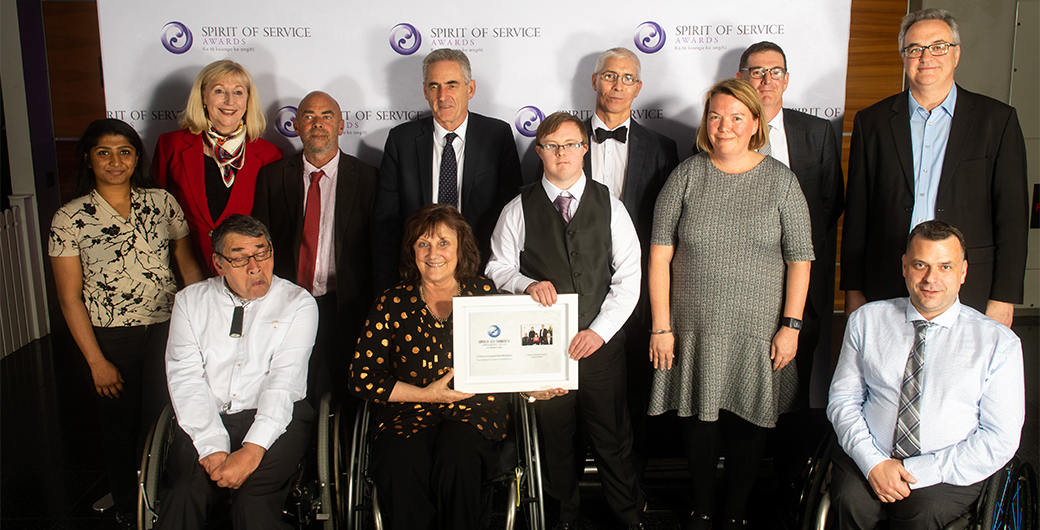
New Zealand’s annual Spirit of Service Awards have recognised the best and most innovative work of the country’s public sector, including an ANZSOG alum for his work in disability services reform.
NZ State Services Commissioner and ANZSOG Board Chair, Peter Hughes said the Awards were an important way to recognise the public servants who actively tried to make a difference.
“Public servants go about their work quietly without expecting any thanks. They work hard for New Zealanders. They come to work wanting to do the best job they can for their communities. The select few who go the extra mile and make a real difference to their country deserve recognition and reward,” Mr Hughes said.
The winners were announced at an evening event at Te Papa, Wellington, on 12 September. ANZSOG was one of the sponsors of the awards, along with Westpac, Deloitte, Skills and Victoria University of Wellington School of Government.
ANZSOG Executive Master of Public Administration (EMPA) alum James Poskitt, General Manager of Community and Family Policy, Ministry of Social Development, was part of the team which won the Leadership in Governance Award for its work on Enabling Good Lives (EGL) – a ten-year program centred around reform of New Zealand’s disability system.
Mr Poskitt said the program’s vision was for people with disability and their families to have greater levels of choice and control over their lives and their support.
The program involved government co-designing a system with people with disability, disability-led organisations and service providers, which allows them to benefit from more personalised funding plans. The current system is a trial but the goal is to expand it by 2021.
“This is about how people with disability and government are partnering to lead a transformation. Collectively we are creating the conditions for enduring partnership and change,” he said.
“People with disability are leading the way but we believe the future is about making EGL the way we all approach our work in the public service, as we all aim for everyone one to have a good life.”
Mr Poskitt said that receiving the award was a huge recognition for the disability community.
“It was a really proud moment to demonstrate in front of peers that sharing control isn’t the same as losing control. You can do genuine co-design with the community and get good results.”
The program was driven by concerns raised by the disability sector about the existing system, which is seen as too organised around government agencies and assessments, and not the needs of people with disability. It has led to a “one-size-fits-all” approach to support that is not tailored to the individual and their circumstances.
Mr Poskitt was part of the 2009 EMPA cohort and said the program had been a useful toolkit for his career.
“It is one of those things that you value more as time goes on and you move and change within the public service. I didn’t move into a policy role until a few years after I had finished my EMPA, but when I did a lot of the theory became very relevant,” he said.
The Prime Minister’s Award and the Better Outcomes Award were both won by the Ministry of Health’s ‘Healthy Homes Initiative’ to improve the health of low-income families with better housing.
The initiative aims to reduce hospitalisations by creating warm, dry homes for low-income families. It has so far delivered more than 46,000 housing interventions — which could involve installing new mechanical ventilation, heating sources, carpets or insulation — to 16,000 families.
Other winners were:
- Service Excellence Award: Tasman District Council, Nelson City Council, Nelson Tasman Civil Defence and Emergency Management, Fire and Emergency New Zealand, Department of Conservation, New Zealand Police, Te Ātiawa o Te Waka-a-Māui Trust, Ngāti Tama ki Te Waipounamu Trust, Ngāti Koata Trust, Ngāti Rarua Iwi Trust, Te Rūnanga o Ngāti Rārua, Te Runanga o Ngāti Kuia, Ngāti Apa ki te Rā Tō Trust, and Te Rūnanga a Rangitāne o Wairau Trust for the response to the Pigeon Valley Fires which transformed relationships between eight Te Tau Ihu (Top of the South) iwi, councils, and government agencies in the region and changed the way iwi are included in emergency centre operations and decision making across New Zealand.
- Māori/Crown Relationships Award: Ministry of Social Development and Ngāti Pāhauwera for a partnership around sustainable employment in the Hawke’s Bay which has enabled iwi to realise their plans and ambitions for sustainable employment in economically deprived areas of the Hawke’s Bay.
- Young Leader of the Year: Jade Kinghazel, Operations Manager, Whakatane Whirinaki Opotiki District, Department of Conservation, for her passionate service to the community and the partnerships she has developed with iwi in a post-settlement context.
- Lifetime Achievement Award: Pasimaca Osment for three decades of inspirational work with prisoners at Paremoremo and Mount Eden.
